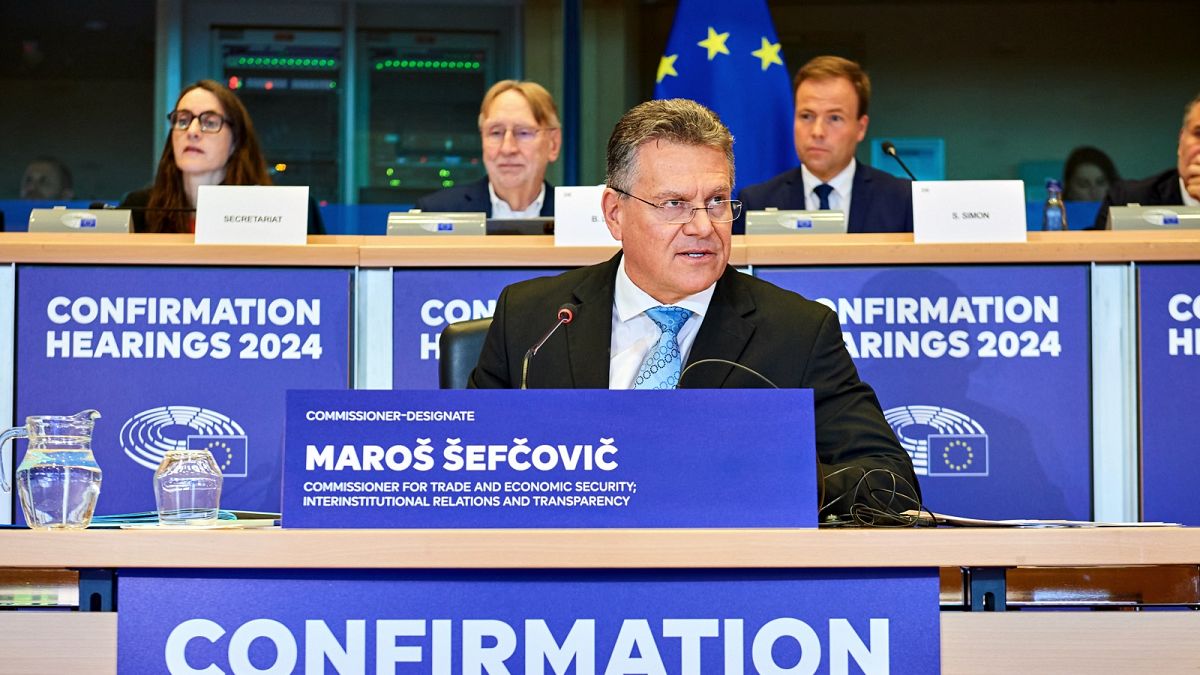Grilled by MEPs on the trade deal with Latin American countries, Slovakia’s Commissioner-designate defended a deal that would satisfy opponents demanding insurances for farmers and transparency.
The contentious EU-Mercosur free trade deal could be “concluded on very very fair ground,” Maroš Šefčovič said on Monday as he underwent his confirmation hearing to be the new European Commissioner for Trade and Economic Security.
Šefčovič, a long-running Commissioner, played it safe and stuck to the script as he answered over three hours of questions at the European Parliament.
Grilled mainly by French MEPs over the Mercosur agreement, as France is the main opponent to the deal, Šefčovič said that the negotiations were at the technical level and had not reached a political level yet.
The trade deal, which has been discussed for more than two decades with Mercosur countries – Argentina, Brazil, Paraguay and Uruguay -, aims to lift trade barriers such as tariffs to create a free trade area covering 780 million people and annual exports and imports worth between €40 and €45 billion.
“Fair ground” for European opponents to the deal means taking into account farmers’ demands and environmental insurances that the Europeans want to see secured in the deal.
While Mercosur countries are resisting in the negotiations on environmental standards, Šefčovič said that EU’s trading partners sometimes see environment as a unilateral request from the EU, perceived sometimes as “regulatory imperialism” and that the EU had to do “more outreach”.
Several months after Europe underwent massive farmers’ protests, the Slovak insisted that the EU is “hypervigilant” to defend EU’s interest.
And to those questioning the transparency of the negotiation process he promised: “Once we know that the negotiations are in the final phase or completed, then, as I promised you, I will come to see you with a PowerPoint, with a calculator, with all the necessary data.”
Grilled one last time over the issue by French MEP Manon Aubry (The Left) who was lashing out on the impact of the Mercosur agreement on farmers and health, Šefčovič almost raised his voice. “For decades, we have been trade partner number one with Latin America, now anywhere it’s China.”
A ‘very complicated’ China
On China, Šefčovič mostly echoed the policy of Ursula von der Leyen, who has steered the bloc towards a more assertive response against Beijing’s unfair trade practices.
The Commissioner-designate described China as a “very complicated and very often difficult” trading partner that presents the bloc with a formidable list of challenges, such as overcapacity, dumping, heavy subsidisation and protectionist restrictions.
Šefčovič firmly defended the Commission’s investigation into China-made electric vehicles, which the executive says are being lavished with excessive subsidies to be sold at artificially low prices worldwide. As a result, the Commission has imposed steep tariffs on imports of Chinese EVs, prompting retaliatory threats from Beijing.
“The EU is not interested in trade wars,” the nominee told MEPs. “We cannot tolerate when subsidies are used to preserve Chinese jobs at the expense of European (jobs).”
EU and Chinese officials are still trying to negotiate a solution based on minimum prices, but this solution, Šefčovič said, has to be as “effective and enforceable” as the duties.
“This is key for us,” he added.
China was also one of the countries that Šefčovič name-checked when he decried the “totally unacceptable” circumvention of the sanctions the EU has slapped on Russia in reaction to the invasion of Ukraine. China has long been accused of propping the Kremlin’s war economy by exporting high-tech products the West has blocked.
In a remark set to irk Beijing, the Slovak committed to deepening trade cooperation with Taiwan, the self-ruling island that has built a world-class semiconductor industry. Recent investments of Taiwanese companies in Europe, such as TSMC’s €3.5 billion plan to build a microchip facility in Dresden and Prologium’s €5.2 billion for a battery plant in Dunkirk, demonstrate the “potential” of EU-Taiwan relations, he said.
Glenn Micallef: young but well prepared
In parallel to Šefčovič’s closely followed hearing, another grilling was underway: that of Glenn Micallef, the 35-year-old Maltese Commissioner-designate for Culture, Sport and Intergenerational Fairness.
Micallef, whose appointment had raised serious eyebrows for his lack of executive experience, strove to dispel any doubts about his readiness for the high-profile job, shining the spotlight on his own generation.
“Young people are underrepresented in politics and less likely to vote. This can lead to policies that disregard their interests and concerns,” Micallef told MEPs on Monday, promising to work with this collective to ensure that no one is left behind.
The Maltese was grilled by the Parliament’s Culture Committee on a wide range of issues, such as a future EU action plan on cyberbullying, the protection of European artists and culture in the age of AI, and how to guarantee the EU budget covers programmes related to culture, sport and youth.
EU funding must have “a real impact on the ground”, he told MEPs, claiming that his focus would be on boosting the sector’s competitiveness, preserving cultural heritage and multilingualism, and promoting culture in all policy areas.
“Culture and the creative sector also have a huge potential for our economy. Yet much of this potential seems to be currently going untapped,” the 35-year-old said.
Unlike other commissioners-designate, Micallef has not previously worked for the EU institutions but he is familiar with Brussels as the former head of Malta’s EU Coordination Unit.

